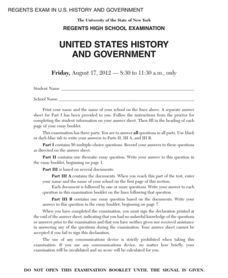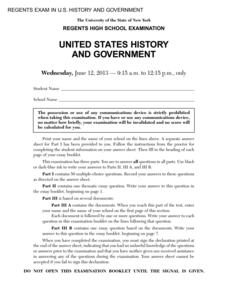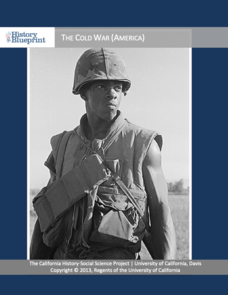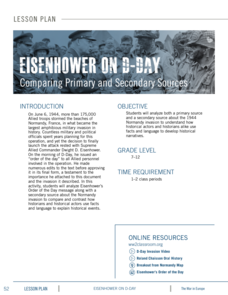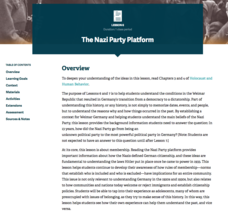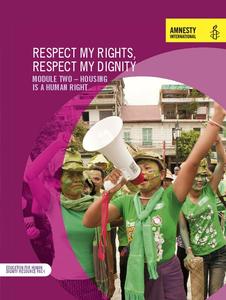New York State Education Department
US History and Government Examination: August 2012
Just how far can the American government go during war time? With primary source documents, learners consider the effects on restrictions of freedom of speech, the detention of American citizens of Japanese descent, and the Patriot Act...
New York State Education Department
US History and Government Examination: June 2013
How successful has American foreign policy been in the past? Pupils consider the question as part of a state examination in American history. Other prompts include a document analysis and essay of important civil rights cases decided by...
New York State Education Department
US History and Government Examination: August 2014
The Gulf War, the Vietnam War, and the Korean War all featured pivotal moments in United States foreign policy. Individuals consider how these conflicts changed the course of American diplomacy using an essay prompt and documents from a...
New York State Education Department
US History and Government Examination: June 2014
The 1960s marked a pivotal point for social and foreign policy in the United States. Using documents, such as speeches from Martin Luther King Jr. and John F. Kennedy, and authentic test prompts, class members consider the impact of this...
New York State Education Department
US History and Government Examination: January 2014
What led the United States to acquire territory? What were some of the effects of those acquisitions? Learners explore the questions using the 2014 essay from the New York Regents exam. Other items include practice multiple choice...
University of California
The Cold War (America)
The Cold War—with its roots in World War II—impacts the world today. Using an extensive curriculum, scholars consider its impact through primary sources, including speeches and propaganda, as well as other skills-enhancing activities. An...
National WWII Museum
Eisenhower on D-Day: Comparing Primary and Secondary Sources
Dwight D. Eisenhower's message to troops for D-Day is iconic. Individuals examine Eisenhower's words and compare that to historians' understanding of the epic events of that day using primary sources, an essay, and a Venn diagram to...
Echoes & Reflections
Perpetrators, Collaborators, and Bystanders
After the Holocaust, the world grappled with how to bring justice to the Nazis. But what to do with the thousands—if not millions—who allowed it to happen? Young historians consider the issues of guilt, collaboration, and responsibility...
National Endowment for the Humanities
Lesson 2: The United States, France, and the Problem of Neutrality, 1796–1801
While the French Revolution could be considered inspired by the American Revolution, it created thorny problems for the new United States. Should the United States get involved and be drawn into a European drama? Was the US strong...
National Endowment for the Humanities
Lesson 3: Britain, Napoleon, and the American Embargo, 1803–1808
While the French were once the allies of Americans, the Napoleonic Wars saw the United States almost drawn into a war with its one-time friend. Wars in Europe threatened to draw in the early republic. A primary source-based activity...
National Endowment for the Humanities
Lesson 1: The United States Confronts Great Britain, 1793–1796
After the Revolutionary War, the success of the United States was far from guaranteed. Foreign powers coveted the new land, and Great Britain challenged American sovereignty. Learners consider the challenges facing the new nation using...
Facing History and Ourselves
The Nazi Party Platform
Not all party platforms stay democratic. A resource covers many political issues in Germany during the time of World War II, and teaches pupils about the Nazi party platform and what went wrong. Individuals participate in a warm-up...
Society for Science & the Public
Easter Islanders Made Tools, Not War
When studying artifacts, especially tools, how do archaeologists determine what the devices were used for? In what ways might researchers' previous experiences influence their perception of an artifact? An article about researchers'...
New York State Education Department
Global History and Geography Examination: June 2016
Assess scholars' knowledge of the changing borders in Germany during World War II with a test that includes both multiple choice and essay questions.
New York State Education Department
Global History and Geography Examination: August 2016
Challenge class members with an architectural resource that asks them to use a variety of skills to answer multiple choice questions as well as several essay prompts about the streets and house fronts of ancient Athens. One question asks...
University of Pennsylvania
Decoding Propaganda: J’Accuse…! vs. J’Accuse…!
Reading snail mail is a great way to go back into history and to understand others' points of view. The resource, the second in a five-part unit, covers the Dreyfus Affair. Scholars, working in two different groups, read one letter and...
University of Pennsylvania
Using Political Postcards to Teach a Revolution of Political Thought
Discuss how political postcards affected everyday people's thoughts and beliefs. Pupils continue a unit on the Dreyfus Affair as they engage in class discussion, watch a video, view a PowerPoint presentation, and fill out worksheets to...
Newspaper Association of America
Using the Newspaper to Teach the Five Freedoms of the First Amendment
Of all the amendments found in The Bill of Rights, the First Amendment contains some of the most important freedoms for American citizens. A unit plan on the First Amendment features interactive lesson plans designed to teach about those...
American Bar Association
News Literacy Model Curriculum in Social Studies
Scholars investigate news literacy in the twenty-first century. They use technology, legal decisions, writings, and digital privacy to analyze the topic. Using what they learned, a group assignment looks into both the challenges and...
Amnesty International
Respect My Rights, Respect My Dignity: Module Two – Housing is A Human Right
Take learners on a journey throughout the world to discover how other people live. Scholars experience a taste of what life feels like for those in poverty and without housing. Activities include discussions, building a cardboard house,...
Amnesty International
Respect My Rights, Respect My Dignity: Module One – Poverty and Human Rights
Creating an environment where learners feel both educated and empowered challenges any teacher when discussing a sometimes bleak topic. A respectful resource provides them with the details and permits them to make a plan of action....
Council for Economic Education
The Role of Government: The Federal Government and Fiscal Policy
Give learners a crash course in balancing the books on the United States federal government level with an economics and government resource. Class members engage in a warm-up discussion and brainstorming session before answering...
Facing History and Ourselves
Laws and the National Community
When it comes to the law, is justice always served? Teach scholars about how law sometimes enables prejudice of entire groups of people with a unit on World War II that includes a warm-up activity, analysis of primary sources,...
Ohio Center For Law-Related Education
Four Activities: Thurgood Marshall and the Nomination and Confirmation of Federal Judges
The process of nominating and confirming federal judges can sound like a lot of bureaucratic hoops, but a resource breaks down the steps of the Supreme Court nominations in a simpler manner. Learners participate in four activities that...
